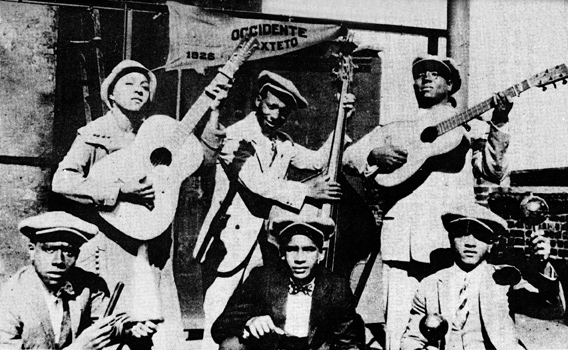
Ignacio Piñeiro
Ignacio Piñeiro Martínez (May 21, 1888 – March 12, 1969) was a Cuban musician, bandleader and composer whose career started in rumba and flowered in the rise of the son. He was one of the most important composers of son music; in total he wrote about 327 numbers, mostly sones. Piñeiro was a brilliant rumbero who worked with musical groups from 1903 onwards. In 1906, was a member of the Timbre de Oro coro de clave y guaguancó (a vocal group precursor of contemporary guaguancó), and later directed Los Roncos, another famous coro de guaguancó. He was taught the double bass by María Teresa Vera, and in 1926 he was a member of her band, Sexteto Occidente, which recorded in New York City. In 1927 he founded the Sexteto Nacional de Ignacio Piñeiro, later simply known as Sexteto Nacional, in which he was the director and songwriter. With the addition of a trumpet the band became the Septeto Nacional. For financial reasons, Piñeiro quit the group in 1935; it was then led by trumpet player Lázaro Herrera until the group disbanded in 1937. Piñeiro became for some years the leader and principal songwriter of Los Roncos. The Septeto Nacional was recreated several times from 1954 onwards, initially under Piñeiro's direction, and it continues to perform. Piñeiro's composition "Échale salsita" (written on a train to Chicago in 1930, and the first song use of the world "salsa" in son) influenced George Gershwin's Cuban Overture. The two met when Gershwin visited Cuba in February 1932. Many of Piñeiro's songs have been performed by other artists like Ray Barretto ("Don Lengua") and René Álvarez ("A la lae la la"). In 1999, Piñeiro was posthumously inducted into the International Latin Music Hall of Fame. |
 = Recordings are available for online listening.
= Recordings are available for online listening.
 = Recordings were issued from this master. No recordings issued from other masters.
= Recordings were issued from this master. No recordings issued from other masters.
Recordings (Results 151-159 of 159 records)
| Company | Matrix No. | Size | First Recording Date | Title | Primary Performer | Description | Role | Audio |
|---|---|---|---|---|---|---|---|---|
| Brunswick | E32939 | 10-in. | 6/3/1930 | Fuego en la Maya | Sexteto Machin | Vocal and instrumental ensemble | composer | |
| Brunswick | HV32989 | 10-in. | June 1930 | No creas que está llorando | Ignacio Piñeiro ; Septeto Nacional | Vocal and instrumental septet | composer, leader | |
| Brunswick | HV32990 | 10-in. | June 1930 | Suavecito | Ignacio Piñeiro ; Septeto Nacional | Vocal and instrumental septet | composer, leader | |
| Brunswick | HV32991 | 10-in. | June 1930 | Quémala | Ignacio Piñeiro ; Septeto Nacional | Vocal and instrumental septet | composer, leader | |
| Brunswick | HV32992 | 10-in. | June 1930 | Incitadora región | Ignacio Piñeiro ; Septeto Nacional | Vocal and instrumental septet | composer, leader | |
| Brunswick | B12942 | 10-in. | 1/19/1933 | Buey viejo : Son | Estrellas Habaneras | Vocal and instrumental ensemble | composer | |
| Gramophone | 0PG114 | 10-in. | 10/10/1932 | La cachimba de San Juan | Don Azpiazu’s Orchestra | Jazz/dance band, with male vocal duet | lyricist, composer | |
| Gramophone | BJ2562 | 10-in. | 10/3/1929 | Arriba guajiro | Septeto Nacional Cuba | Instrumental ensemble | composer | |
| Gramophone | BJ2563 | 10-in. | 10/3/1929 | Asturias, patria querida | Septeto Nacional Cuba | Instrumental ensemble | composer |
Citation
Discography of American Historical Recordings, s.v. "Piñeiro, Ignacio," accessed November 22, 2024, https://adpprod1.library.ucsb.edu/names/109682.
Piñeiro, Ignacio. (2024). In Discography of American Historical Recordings. Retrieved November 22, 2024, from https://adpprod1.library.ucsb.edu/names/109682.
"Piñeiro, Ignacio." Discography of American Historical Recordings. UC Santa Barbara Library, 2024. Web. 22 November 2024.
DAHR Persistent Identifier
External Sources
Wikipedia: Ignacio Piñeiro
Discogs: Ignacio Piñeiro
Allmusic: Ignacio Piñeiro
IMDb: Ignacio Piñeiro
Linked Open Data Sources
LCNAR: Piñeiro, Ignacio, 1888-1969 - http://id.loc.gov/authorities/names/no93023043
Wikidata: Ignacio Piñeiro - http://www.wikidata.org/entity/Q3099359
VIAF: http://viaf.org/viaf/363149294364380522303
MusicBrainz: Ignacio Piñeiro - https://musicbrainz.org/artist/21bd1736-525e-4b18-89f2-2de041ed8eb1
Wikipedia content provided under the terms of the Creative Commons BY-SA license
Feedback
Send the Editors a message about this record.
